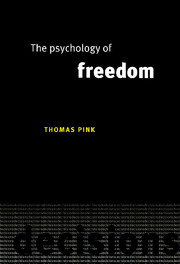Book contents
- Frontmatter
- Contents
- Acknowledgments
- Introduction
- 1 Agency and the will
- 2 Scepticism about second-order agency
- 3 Decision-making and freedom
- 4 The Psychologising conception of freedom
- 5 Decision rationality and action rationality
- 6 Decision-making and Teleology
- 7 The Regress argument
- 8 In defence of the Action model
- 9 The special-purpose agency of the will
- Conclusion
- Bibliography
- Index
3 - Decision-making and freedom
Published online by Cambridge University Press: 31 August 2009
- Frontmatter
- Contents
- Acknowledgments
- Introduction
- 1 Agency and the will
- 2 Scepticism about second-order agency
- 3 Decision-making and freedom
- 4 The Psychologising conception of freedom
- 5 Decision rationality and action rationality
- 6 Decision-making and Teleology
- 7 The Regress argument
- 8 In defence of the Action model
- 9 The special-purpose agency of the will
- Conclusion
- Bibliography
- Index
Summary
DEPENDENCE
So far we have been discussing whether there is a second-order agency of the will – whether taking a particular decision to act is something which we deliberately do.
But what hangs on our possessing such an agency of the will? Hobbes thought nothing much – and certainly not our freedom of action, of which, as we have seen, he gave a strikingly economical account:
AFREE-MAN, is he, that … is not hindred to doe what he has a will to … from the use of the word Free-will, no Liberty can be inferred of the will, desire or inclination, but the Liberty of the man; which consisteth in this, that he finds no stop, in doing what he has the will, desire, or inclination to doe.
(Leviathan, p. 146)In Hobbes' view we lack freedom of action only to the extent that hindrances would prevent the successful execution of our decisions or, what came to the same thing for Hobbes, the satisfaction of our desires. On the Hobbesian theory, then, there is no dependence of our action control on any prior control over which actions we decide to perform. No agency of the will is needed for freedom of action.
But that is not what we ordinarily suppose. Our freedom to act otherwise than as we actually do does seem to us to depend on our also having a freedom to decide otherwise than as we actually do.
- Type
- Chapter
- Information
- The Psychology of Freedom , pp. 64 - 100Publisher: Cambridge University PressPrint publication year: 1996



